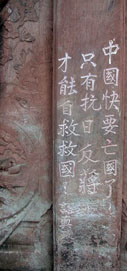
About
Project history
This project is a digital ethnography, or the interactive presentation of focused, long-term fieldwork research results in the form of an online monograph, media archive, and information structures such as relational databases, and GIS mapping. Our aim is to use the project's digital form to reinforce its ethnographic content, using new technologies to render more transparent the relationship between source and interpretation, to open up non-linear narrative paths through the ethnography, and therefore to more vividly reveal the interconnections among different dimensions of village life that are the core content of the project.
The overall approach we want to adopt in the digital ethnography is
to maximize freedom of intellectual movement through a thick set of
primary sources and interpretive essays. The reader is thus liberated
from a fixed “authorial” linear narrative, and enabled to
move through a tissue of alternative narratives that are
“opened” both by disclosing the source material on which
our interpretations are based (i.e., artifacts) and by the interactive
functions of the maps and database (i.e. search functions). At the same
time, the reader is not simply free floating in an inchoate mass of
information. All the artifacts comprise media that are embedded within
a contextual framework of data, and the selected keyword approach to
searching, along with the set number of map layer variables integrated
with the essays and artifacts, creates a guiding structure for the
digital ethnography as a whole.
We began working on the digital version of the ethnography in 2001
at the University of North Carolina at Charlotte, refining prototypes
of the site structure and digital mapping component, and using the
website in courses. A sabbatical year in Ya'an in 2004 allowed us to
expand the project's geographical scope and to develop our research
materials into multimedia "artifacts." A 2007 NEH Summer Stipend
enabled John to work on GIS mapping, and in 2008, an ACLS Digital
Innovation Fellowship funded a yearlong collaboration with the
Institute for Advanced Technology in the Humanities (IATH) at the
University of Virginia to create the website's core information
structures, relational database, and overall design.
Project Documentation
One of our main goals is to provide documentation on the whole development process of this project, from grant application to database design to GIS mapping to final online implementation. Below we make available the schema and editorial policy documents that govern the database, as well as the original grant applications to the ACLS Digital Innovation Fellowship and to the NEH Summer Stipend program.
Credits and acknowledgments
Special thanks go to:
American Council of Learned Societies
Institute for Advanced Technology in the Humanities, University of Virginia
University of North Carolina Charlotte
NEH Summer Stipend
Worthy Martin, Institute for Advanced Technology in the Humanities, University of Virginia
Robbie Bengler, Institute for Advanced Technology in the Humanities, University of Virginia
Cindy Girard, Institute for Advanced Technology in the Humanities, University of Virginia
David Germano, University of Virginia
Cecelia Hamilton, University of North Carolina, Charlotte
